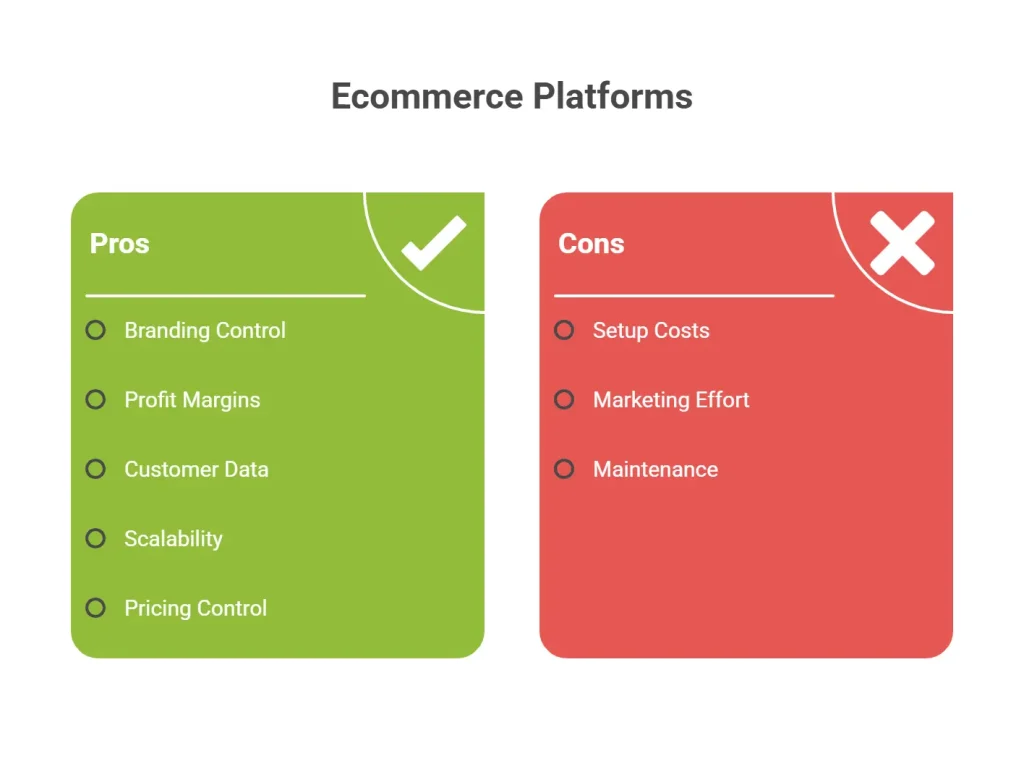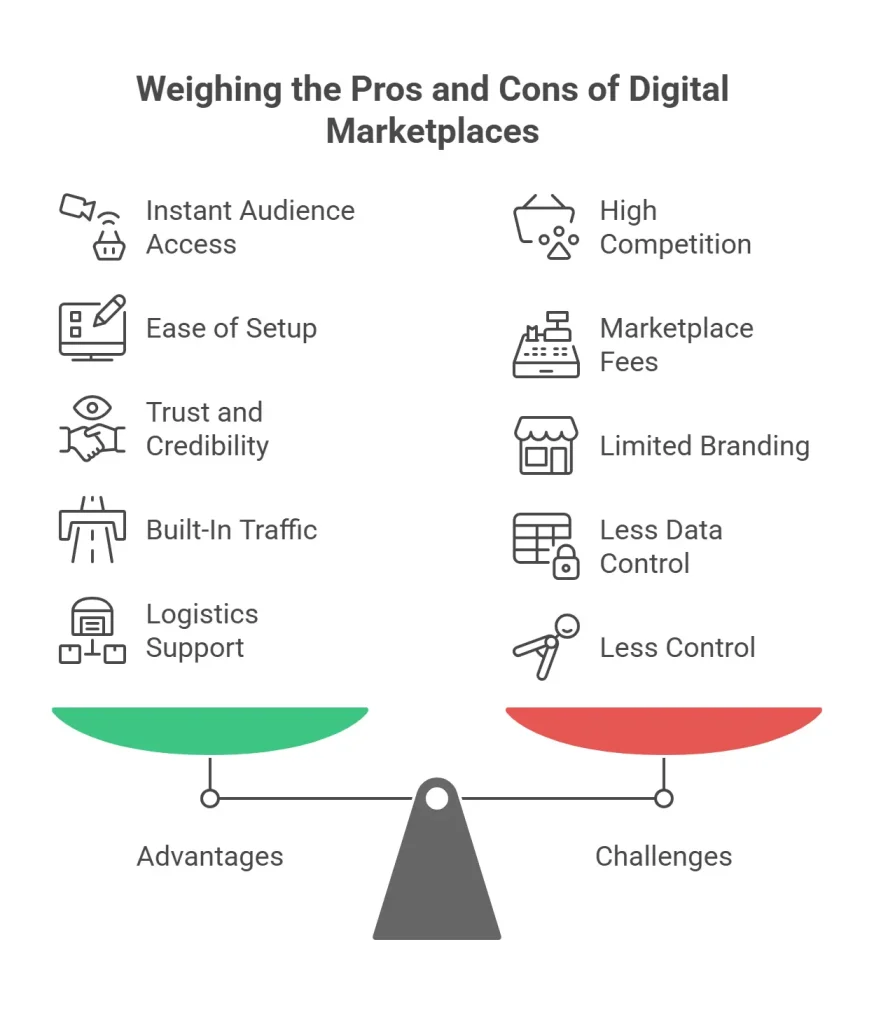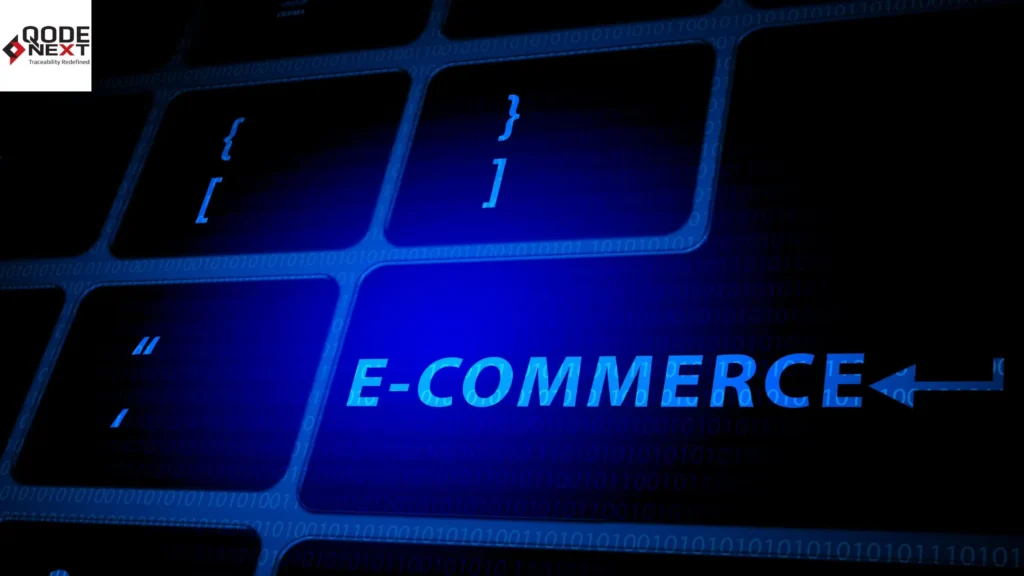The online selling landscape has evolved significantly, giving businesses multiple avenues to reach their customers. However, choosing between ecommerce platforms and digital marketplaces can be challenging. While both options offer unique advantages, selecting the right one depends on business goals, budget, and scalability requirements.
In this guide, we will compare ecommerce platforms and digital marketplaces, examining their benefits, drawbacks, and ideal use cases. By the end, you will have a clear understanding of which selling model suits your business needs.

What Are Ecommerce Platforms?
Ecommerce platforms are software solutions that allow businesses to build, manage, and operate their online stores independently. They provide tools for product listings, payment processing, order fulfillment, and customer management.
Best Ecommerce Platforms
- Shopify – User-friendly and highly customisable.
- WooCommerce – Ideal for WordPress users.
- Magento – Advanced features for large businesses.
- BigCommerce – Scalable for growing brands.
Advantages of Ecommerce Online Marketplaces
- Full Control Over Branding – You design and customize the store’s appearance and user experience. No third-party branding influences your store’s presentation.
- Better Profit Margins – No marketplace commission fees. You keep 100% of the sales revenue, minus payment gateway fees.
- Customer Relationship Management – Direct access to customer data for personalised marketing. Ability to build long-term customer loyalty and retention.
- Scalability and Growth – Expand product catalogs without marketplace restrictions. Implement SEO, content marketing, and paid ads for better visibility.
- Flexible Pricing Strategies – You set product prices and control discounts without external restrictions.

Challenges of Ecommerce Platforms
- Initial Setup Costs – Requires investment in web hosting, design, and development.
- Marketing Responsibilities – No built-in audience; you must drive traffic through SEO, ads, and social media.
- Website Maintenance – You must handle security, updates, and technical issues.
What Are Digital Marketplaces?
Digital marketplaces are online platforms where multiple sellers list and sell their products to a pre-existing audience. These marketplaces handle transactions, logistics, and customer service to some extent.
Popular Digital Marketplaces
- Amazon – The largest global marketplace with high customer trust.
- eBay – Best for auctions and rare products.
- Etsy – Ideal for handmade and vintage items.
- Walmart Marketplace – A growing alternative to Amazon.
Advantages of Digital Marketplaces
- Instant Access to a Large Audience
- Millions of active buyers are already searching for products.
- No need to invest heavily in marketing.
- Ease of Setup
- Simple registration and product listing process.
- No need for web development or hosting.
- Trust and Credibility
- Customers trust established marketplaces.
- Secure payment gateways increase purchase confidence.
- Built-In Traffic
- Marketplaces spend on advertising, bringing buyers to the platform.
- Higher chances of organic product discovery.
- Logistics Support
- Fulfillment services (e.g., Amazon FBA) handle storage, packaging, and shipping.
- Reduces operational complexities for sellers.

Challenges of Digital Marketplaces
- High Competition – Thousands of sellers offer similar products.
- Marketplace Fees – Commissions, referral fees, and storage fees eat into profits.
- Limited Branding – Marketplace restrictions prevent full customization of storefronts.
- Less Control Over Customer Data – No direct access to customer emails or analytics for remarketing.
Ecommerce Platforms Vs. Digital Marketplaces: A Side-by-Side Comparison
| Feature | Ecommerce Platforms | Digital Marketplaces |
| Control & Branding | Full control over website, design, and branding. | Limited branding options due to marketplace rules. |
| Marketing & Traffic | Requires SEO, paid ads, and social media marketing to drive traffic. | Built-in customer base with organic traffic. |
| Competition | Less competition as you control the niche and audience. | High competition with multiple sellers offering similar products. |
| Customer Relationship | Direct customer interaction and data access. | Marketplace owns customer data and limits direct communication. |
| Setup Complexity | Requires website development and maintenance. | Easy setup with simple product listings. |
| Profitability | Higher profit margins, no commission fees. | Lower margins due to marketplace commissions. |
| Scalability | Can scale with digital marketing and custom features. | Limited by marketplace policies and fees. |
Which One Should You Choose?
Your decision should align with your business objectives, budget, and growth strategy.
Choose Ecommerce Platforms If:
- You want full control over branding, pricing, and customer relationships.
- You are ready to invest in website development and marketing.
- You aim to build long-term brand loyalty.
- You prefer higher profit margins without marketplace fees.
Choose Digital Marketplaces If:
- You want quick access to a ready-made audience.
- You don’t want to manage website maintenance.
- You are comfortable with paying commissions for marketplace visibility.
- You want to test a product before building a full-fledged store.
Can You Sell on Both?
Yes! Many successful businesses leverage both ecommerce platforms and digital marketplaces. Here’s how you can benefit from a hybrid strategy:
Use marketplaces to gain exposure and attract new customers.
- Direct customers to your ecommerce store for repeat purchases and exclusive deals.
- Test new products on marketplaces before adding them to your ecommerce store.
- A hybrid approach maximises revenue streams while balancing control and market reach.
Conclusion
Choosing between ecommerce platforms and digital marketplaces depends on your business goals. If you seek brand control and long-term growth, an ecommerce store is the way to go. If you need quick access to customers with minimal setup, digital marketplaces are a great option.
A balanced approach—leveraging both—can help you scale efficiently while maximising sales. Do you need help to optimise your supply chain strategy? Contact Qodenext today.
FAQs – Online Marketplaces
1. What is an ecommerce platform?
An ecommerce platform allows you to create and run your independent online store,
2. Which ecommerce platform is the best?
The best ecommerce platform depends on your needs. Shopify is great for beginners, WooCommerce is ideal for WordPress users, and Magento suits large enterprises.
3. Are ecommerce platforms better than marketplaces?
It depends on your business model. Ecommerce platforms offer more control and branding, while marketplaces provide instant exposure and ease of selling.
4. How do I increase organic traffic to my ecommerce store?
To drive traffic to your store, you can use SEO, content marketing, paid ads, and social media campaigns.
5. Do retailers need technical skills to run an online eCommerce platform?
Most e-commerce platforms (such as Shopify and WooCommerce) are user-friendly, but advanced customisation may require some technical knowledge.
6. Can I sell on both an ecommerce platform and a marketplace?
Yes! Many businesses use both strategies to maximise sales and brand awareness.
7. Which option is more cost-effective?
Ecommerce platforms have upfront costs but offer higher profit margins. Marketplaces have lower startup costs but charge commissions on sales.
8. How do marketplaces handle residential shipping?
Many marketplaces, like Amazon FBA, offer fulfillment services to manage storage, packing, and shipping for buyers and sellers.
9. Can I switch from a marketplace to an ecommerce platform later?
Yes, you can start with a marketplace and later build your ecommerce store as your brand grows.
10. Which option is best for a small business?
For quick sales, a marketplace is ideal. For long-term growth, an ecommerce platform is better.







